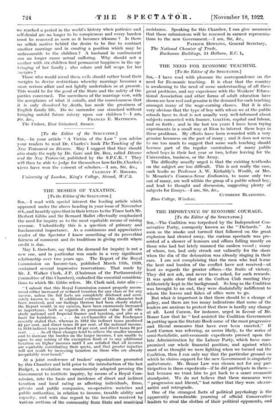THE 'MESHES OF TAXATION.
[To the Editor of the SPECTATOR.] read with special interest the leading article which appeared under the above heading in your issue of November 4th, and heartily agree that in their letters to the Times both Mr. Herbert Gibbs and Sir Bernard Mallet effectually emphasized the need for inquiry as to the most equitable means of raising revenue. Undoubtedly this is a question of primary and fundamental importance. As a continuous and appreciative reader of the Spectator I know something of its proverbial fairness of comment and its traditions in giving credit where credit is due.
May I, therefore, say that the demand for inquiry is not a new one, and in particular was made in a very significant relationship over two years ago. The Report of the Royal Commission on Income-tax, published March 11th, 1920, contained several impressive reservations. That made by Mr. J. Walker Clark, J.P. (Chairman of the Parliamentaiy Committee of this Chamber), embodied the essential considera- tions to which Mr. Gibbs refers. Mr. Clark said, inter alia :- " I submit that this Royal Commission cannot properly recom- mend either increased or reduced taxation for any class or for any income, unless the full facts arc completely disclosed and accu- rately known to us. If additional evidence of this character had been received, and our findings thereon had been clearly stated, the Report would, in my opinion, have been enormously increased in importance, both as regards its permanent value to all who study national and Imperial finance and taxation, and also as a basis for legislation. . . . An ex-Chancellor of the Exchequer recently stated that, whereas in 1912 the indirect taxes produced 42 per cent. and direct taxes 58 per cent. of the national income, in 1918 indirect taxes produced 18 per cent. and direct taxes 82 per cent. . . . As all these changes tend to relieve the smaller incomes and to increase the burden on the larger incomes, I am unable to agree to any raising of the exemption limit or to any additional
i
taxation on higher incomes until I am satisfied that all incomes are equitably contributing their quota, and that greater injustice will not result by increasing taxation on those who are already inequitably over-taxed."
At a joint conference of traders' organizations promoted by this Chamber and held prior to the introduction of the last Budget, a resolution was unanimously adopted pressing the Government to institute inquiry, by means of a- Royal Com- mission, into the basis and incidence of direct and indirect taxation and local rating as affecting individuals, firms, private and public companies, co-operatiVe societies and public authorities, in relation to income, taxable ability and capacity, and with due regard to the benefits received by various sections of the community from State and municipal
assistance. Speaking for this Chamber, I can give assurance that these submissions will be renewed in earnest representa- tions to the new Government.—I am, Sir, &e., Buchanan Buildings, 24 Holborn, E.C. 1.






































 Previous page
Previous page